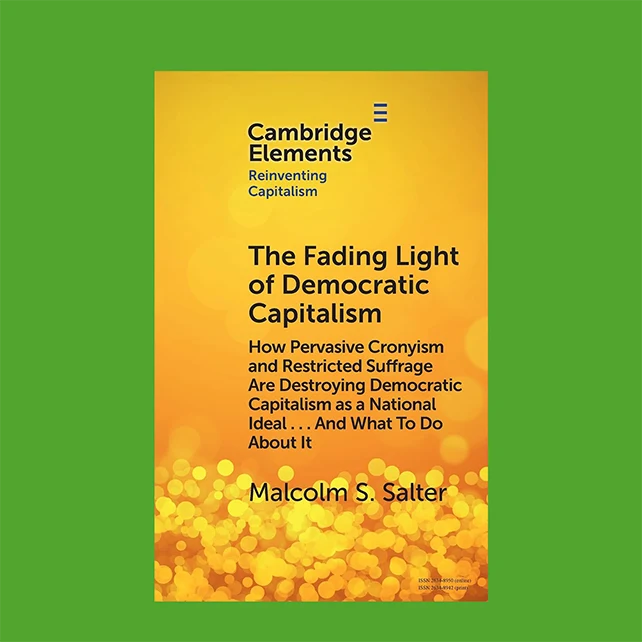The following is an excerpt from the book The Fading Light of Democratic Capitalism, written by Malcolm S. Salter.
At first look, one might conclude there is a remarkable dearth of respected democratic capitalist evangelists today. But this conclusion is not accurate. There is, in fact, an emerging cadre of intellectual leaders working on democracy renovation projects and, by direct application, the renovation of democratic capitalism as a practical governance ideal for the United States going forward. Two notable examples are philosophy professor and political activist Danielle Allen and law professor and political activist Lawrence Lessig, both of Harvard University. Allen founded Partners in Democracy, which works with dozens of partners in the democracy renovation space around the country focusing on voter registration, voter turnout for elections, accessibility of voting, the competitiveness of elections, ease of candidate ballot access, candidate representatives, government responsiveness, legislative and administrative transparency, and strong news coverage. Lessig founded Equal Citizens, whose goal is reforming the Electoral College and Super PACs and reducing the corrosive influence of big money in politics.
In addition to these established pioneers, there are many inquisitive and informed senior executives and established political leaders who could become spokespeople or evangelists, if they chose to do so—persons already working with such organizations as the Business Roundtable, the Conference Board and its CED, the Aspen Institute, the Problem Solvers Caucus in Congress, and those serving in various state and national legislative bodies.
Never before have evangelists for a truer form of democratic capitalism had more knowledge and more grassroots and national-level democracy support groups available to them. With this intellectual and political infrastructure moving into place, the time to start socializing the norms and values comprising a supportive moral culture for democratic capitalism is at hand. Action principles have never been clearer. And an implementable plan of action to renovate democratic capitalism is beginning to take shape. Others can undoubtedly add to the renovation work plan I have proposed here, but the essential elements of such a plan need to include:
Curbing cronyism through reforms in campaign finance laws (including alternate campaign financing schemes that allow candidates to free themselves from large, controlling donors); federally mandated requirements for Super PACs to disclose their donors (thereby eliminating the massive presence of dark money in electoral campaigns, Congressional lobbying, and ballot initiatives); greater transparency in corporate reporting of campaign and lobbying spending; a slowdown in the revolving door between business and government; and, most critically, the nullification of the Supreme Court’s democracy-destroying Citizens United decision by passing the proposed twenty-eighth amendment to the Constitution.
Strengthening citizen voice and influence as a countervailing power to wealthy and influential elites (corporate and otherwise) who have captured large segments of our legislative and regulatory establishment—by improving ballot access for a more diverse population of candidates and reducing restrictions on citizens’ right to vote on all candidates.
Working to create more democracy-supporting firms that mirror the application of democratic principles of fairness and reciprocity in economic and political markets through selective power sharing with key constituencies and the liberation of firms from the obsessive pursuit of the problematic doctrine of shareholder wealth maximization.
Advancing a moral culture conducive to democratic capitalism through social movement tactics that include public education and support for evangelists and spokespersons who can alert the nation to the idea that the perceived legitimacy of our system of economic and political governance can be restored by practicing the democracy principles that we teach and admire as a nation. This includes the principles of fairness, political equality, and power sharing (collaborative problem-solving) rather than individual utility maximization based on narrowly defined self-interest.
As daunting as this restoration program is, it makes little sense to wait for another existential threat or crisis to shock us into a changed mentality. Nor do we have time to wait for the moral pendulum to swing away from the currently celebrated ethos of self-serving utility maximization back in the direction of mutuality.
The longer we wait for the restoration to actuate, the more the decline of democratic capitalism as a national ideal will become irreversible. And without the restoration of our national ideal and a renewal of Americans’ faith that democratic capitalism is working for them, rather than against them, social unrest and political dysfunction will inevitably accelerate.
Hopefully, Ralph Waldo Emerson’s assertion—that “America is the country of tomorrow”—will be proven correct once again, with that “tomorrow” including the restoration of democratic capitalism as a credible aspiration for our country. To that end, we have great work to do together.
Reproduced from The Fading Light of Democratic Capitalism by Malcolm S. Salter, © 2024 Cambridge University Press, with permission of the Licensor through PLSclear.


